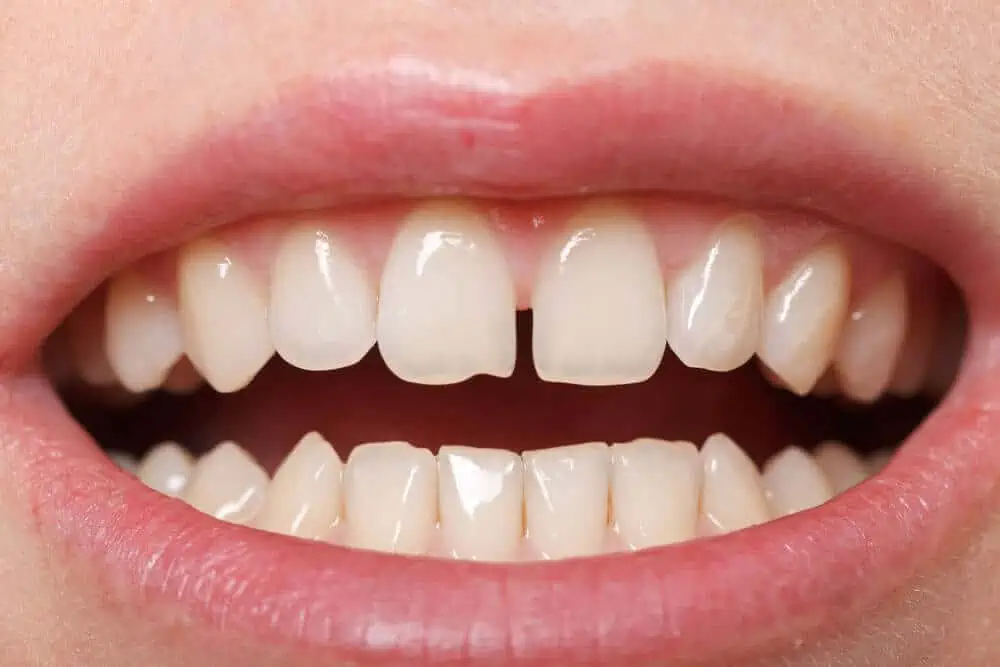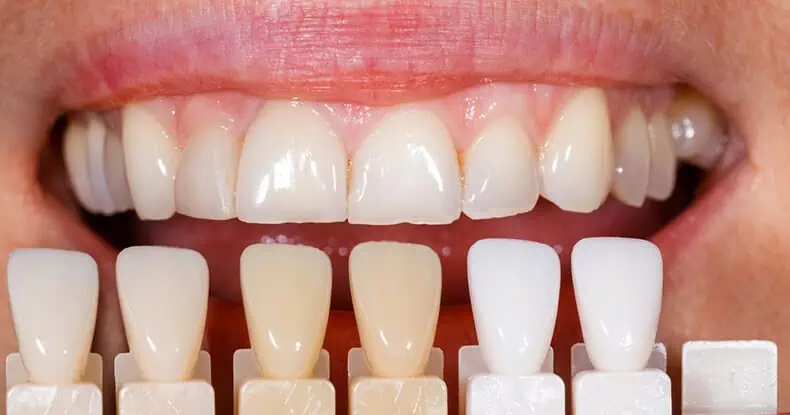Are you considering asking your dentist about composite bonding? Then you’re probably asking yourself, ‘how much is composite bonding in the UK?’
Whatever your reason, we want to make sure you have all the information you need regarding cosmetic procedures like composite bonding. That way you can make informed decisions on dental procedures and which ones best fit your needs.
Here we will discuss everything you need to know about dental composite bonding in the UK, including the following questions:
- What is composite bonding?
- How long does the procedure take?
- How much can composite bonding cost?
- How long does composite bonding last?
- Are there alternatives to composite bonding teeth?
- What are the risks or disadvantages of dental bonding?
By answering these questions we hope to give you an idea of whether or not this procedure is right for you. That said, you should always consult your dentist about the potential benefits and risks of any dental work before committing to a procedure or using any DIY dental kits.
Before we get into the risks, let’s find out exactly what composite bonding is.
In This Article
What is composite bonding?

Bonding often refers to adhesives in dental work. But, composite bonding, otherwise known as dental bonding or tooth bonding, is a procedure that involves changing the appearance of your smile for cosmetic purposes. It is a way to cover mild damage like chips and cracks in your teeth, as well as any gaps between them.
Usually focused on the front teeth, dentists use a composite resin similar to what they use for minor fillings. This material is a putty-like substance that your dentist moulds to the desired shape. Then the dentist hardens it with a UV light and polished to closely resemble a natural tooth.
Why might someone want dental bonding?
Composite bonding teeth is a cosmetic procedure to improve the aesthetic of your smile, though it isn’t a solution to any medical or structural problems in your teeth. There are, however, a few issues that it can address. These include:

- Diastema (gaps between teeth)
- Cracked or chipped teeth
- Discoloured teeth
- Teeth that are crooked or misshapen
Essentially, composite bonding is meant to even out the size, shape, or colour of teeth or cover any minor issues in your smile.
What is the process for composite bonding (UK)?
If you want to treat your smile with composite bonding then the first thing that you need to do is consult your dentist. Your dentist will assess your teeth to see if you are eligible for the procedure and whether it’s the right choice for you. The following steps outline the rest of the composite bonding process:
- The colour of composite resin is matched to your natural teeth
- Your dentist will prepare the surface of your teeth and apply a layer of adhesive material
- The resin will then be applied and shaped into the desired final shape of the tooth
- A UV light will be used to quickly harden the material
- Finishing touches include buffing out rough or uneven spots and polishing the resin to match the rest of your teeth
Once your dentist properly hardens and polishes the resin, you can resume regular eating and drinking habits right away without any waiting period after your procedure.
In the following video, a dentist explains composite bonding teeth and the procedure involved. The video includes a patient having the procedure as well as dental bonding before and after clips of the patient’s teeth.
If you are considering getting this procedure, we recommend asking dentists for pictures of before and after composite bonding. They should be able to show you images from previous patients, which will give you an indication of how experienced a dentist is with the procedure.
How long does the procedure take?
Generally, a dentist will need anywhere from 30–60 minutes per tooth to ensure that the adhesion, shaping, and finishing of the composite resin is all done properly. Where the length of your procedure falls within that range will depend on your dentist’s experience, efficiency, and attention to detail.
Not all composite bonding procedures are the same. Some people use dental bonding to improve the look of a single mismatched tooth. Still, others will totally revamp the shape and spacing of their smile. This of course will make the composite bonding cost in the UK be much higher.
How long does composite bonding last?
Composite bonding lasts an average of five to ten years before needing you should replace it, but there are different factors involved. First of all, different types of composite resin have different properties.
More durable resins don’t look quite like natural teeth and so are generally used farther back in the mouth. Your dentist will likely use a less durable resin that more closely resembles natural teeth for your front teeth.

Here are a few ways you can care for your composite bonded teeth to hopefully get a few more years out of them:
- Proper oral hygiene: Tooth decay can weaken the adhesion between the resin and your teeth. With or without bonding, brushing your teeth and flossing properly are still the best way to keep your smile looking great!
- Avoid hard foods and chewing ice: Composite resin is not as durable as your natural teeth, so the same habits that wear down teeth will degrade your dental work even faster.
- Try not to grind your teeth: Though for some it’s easier said than done, by reducing stress or saying no to that third cup of coffee you can significantly reduce damage to your bonded teeth.
- Don’t whiten your teeth: Even though it may not be at the same rate, composite resin and natural teeth will stain together. The difference will only become noticeable after whitening procedures, which will work on natural teeth and not on bonded teeth!
Getting dental bonding is a perfect reason to try and break some bad habits. With proper care and cleaning, bonded teeth can maintain their strength and natural look for years!
How much is composite bonding UK?
Composite bonding costs in the UK can vary greatly between dentists and from practice to practice. Prices also differ between patients depending on the number of teeth needing to be done. Prices can run anywhere from £90 to £200 per tooth on average, but in some cases, they can be up to £400 per tooth.
Before scheduling an appointment for teeth bonding, you should always get a quotation for dental bonding cost UK so you know what to expect. If you are concerned about the price, you can always look into dental financing to help with costs.
Or, for more affordable prices, dental tourism is always an option. For example, you could get high-quality veneers in Turkey for less than the composite bonding cost in the UK.
Is tooth bonding available on the NHS?
Composite bonding is classed as a purely cosmetic procedure, so unfortunately not one of the treatments available on the NHS. Generally, you can only get medically necessary procedures with the NHS.

Can you do tooth bonding at home?
There are several different kits for teeth bonding at home, but they have quite a few disadvantages. To begin with, at-home teeth bonding kits are really only meant for the most minor of cases. You wouldn’t be able to do anything advanced like filling gaps between your teeth.
Beyond that, you simply won’t have the tools that a dentist uses to achieve a strong bond and natural look. A dentist will choose among several composite resins to best fit your needs and will make use of picks, mirrors, and some motorized tools to give a result that is indistinguishable from natural teeth.
Ultimately, while you can save money on a minor procedure with composite bonding teeth at home, we don’t recommend it over proper dental care. You will almost certainly get a better-looking and longer-lasting result from a dentist.
Are there alternatives to tooth bonding?
Tooth bonding is not the only way to cosmetically alter the shape of a tooth or even your whole smile. Dental bonding can mask damage or decay, but for more severe cases a dental crown may be more suitable. Your dentist will be able to assess your teeth and let you know which type of treatment will work best for you.
With regards to purely cosmetic bonding, traditional dental veneers such as porcelain veneers offer a popular alternative to composite resin, both offering certain advantages over the other. Let’s take a closer look.
The following table summarises the differences between porcelain veneers and dental bonding treatments:
Composite bonding | Porcelain veneers | |
Cost | £90 - £300 per tooth | £450 to £850 per tooth |
Number of appointments needed | Usually 1 | 2-3 |
Longevity |
|
|
Other considerations | Enamel removal is very rare and almost always reversible | Almost always require enamel removal which cannot be reversed |
Porcelain veneers have a few major benefits over dental bonding. First, they are more durable and can be expected to last up to twice as long as dental bonding. On top of their durability, they are less likely to stain over time and tend to have a more natural look without having to sacrifice longevity.

However, you can pay up to twice as much per tooth. You will also have to invest more time because veneers must be made in advance, requiring several appointments before they are actually installed.
Most importantly, you can remove composite resin in the future, and the process can usually be fully reversed. To place porcelain veneers, a dentist will almost always need to remove enamel from your teeth.
Though the final product is functionally as good as a natural tooth, you won’t be able to restore your original smile to the way it was.
Conclusion
Composite bonding teeth is low-risk and teeth bonding costs in the UK are relatively low when it comes to cosmetic procedures. It can significantly change the look of a single tooth or your whole smile depending on how many teeth you decide to get done.
The procedure involves shaping composite resin onto your teeth. Once your dentist is happy with how your teeth look, the resin is hardened with a UV light and polished for a natural finish.
Though there are some kits designed to let you perform minor repairs at home, a dentist will give you much better results, as they have the proper tools and much more experience.
The cost and treatment length associated with this procedure varies from patient to patient. Generally it can be completed within a single visit to the dentist, and depending on how well you care for your dental work, composite bonding can last anywhere from 5 to 15 years.
The main alternative to composite bonding is porcelain veneers, which are fabricated in advance and attached to your teeth. This is a more expensive and time-consuming procedure but gives longer-lasting and more stable colour results.
And remember, you can chat with a dentist at any time — 24/7 about dental bonding. A team of certified dentists is standing by at JustAnswer.
FAQs
Composite bonding teeth is the dental procedure in which a dentist applies composite resin to teeth to change the shape, colour and overall appearance of your smile.
Unfortunately, you can’t. Composite resin is a fairly porous material once it’s hardened, making it is very susceptible to intrinsic staining which is almost impossible to remove from bonded teeth. However, extrinsic stains can be whitened, such as those on the surface of your natural teeth.
Just as you can’t whiten bonded teeth at home, neither can a dentist. However, a dentist can apply a thin layer of resin to even out the colour of your teeth, and make them appear whiter. Bear in mind that if you are a frequent smoker or drink a lot of coffee and red wine, your teeth will continue to stain.
Fortunately, dental bonding doesn’t require a recovery period, although you may want to wait a few days before returning to habits that can stain teeth like smoking or drinking coffee. You may avoid consuming highly pigmented food and drink altogether.
NHS. NHS services and treatments. Consulted 1st November 2021.





